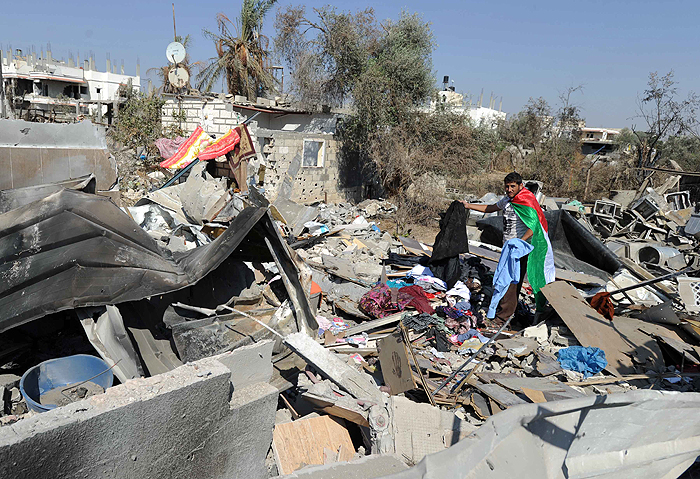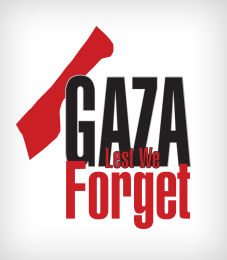
♦ The basic tenet of Palestinian consciousness is that Palestinians must reject all value systems that seek to make them foreigners in the country of their birth and reduce their basic human dignity. Life is not a matter of things or comfort; rather it concerns the basic human rights of family, country, justice, and human dignity.
♦ As long as the Israeli occupation continues, there will be Palestinian human dignity that is conscious of and rebels against that oppression. Without our human dignity, we would have to “bear our burdens” or “suffer through in silence.” We would have no pride – no reason to be outraged at crimes committed against us.
“I am still alive,” my Gazan friend reassured me over the phone. He laughed nervously. “The municipal workers have cleared some of the rubble and I took a walk. I saw an Internet café open and decided to call you.”
I have not been to Gaza in over fifteen years. The family citrus farm in Beit Lahia was razed to the ground a long time ago, and through the years the phone calls with family and friends have become fewer and far between. In fact, I had not heard from Riyad for over five years!
“My immediate family has survived the shelling. Our house is among the few that remain standing in Al-Shujaiyyeh.” He answered my inquiry given the great number of displaced, martyred, and injured Gazans. “Not a single family has been spared the loss of one of its members,” he added after a brief pause. “I lost an aunt and two uncles. But my immediate family has survived so far. Yet at any moment I could die. Right now as I talk to you, or as I walk back home, I may be hit by a missile. Death hangs everywhere.” He chuckled in an effort to make light of the grave situation. “There is no place that is safe.”
“I do not have the nerve to call my colleague in Khan Yunis,” he confided. “He and his wife are in their mid-fifties, and they have lost their three children. I am afraid he would break down and I couldn’t face it. I called you instead.”
“Are there fresh vegetables, fruit, meat, tomatoes?” I changed the subject.
“We have been eating things we hardly ever eat: canned fava beans, chick peas, sausages, and dried smoked meat. But thanks be to God we have these tins!”
All visuals in the media have depicted an apocalyptic scene of death and destruction. Nothing was left standing by the vindictive Israeli army as they turned their rampage of vile hate from the West Bank to Gaza. No effort was spared as the occupying army indifferently bombed its way into the densely populated Palestinian territory in a diffident show of power.
“There is a temporary ceasefire, and I took a walk,” he explained light-heartedly. “The entire neighbourhood has been blown down. Only a few houses, including ours, have not yet been demolished.”
Humans, dogs, cattle, donkeys and horses, pigeons and chickens lay dead, scorched by incinerator missiles or shot in cold blood by Israeli snipers. Even the electricity-generating engines in Gaza have been blown up. It is as though a cataclysmic natural disaster has rocked Gaza to the ground.
“We have no choice. We even drink the salty water from the fire hydrants,” he chuckled. “We are lucky to be alive.”
The feelings of horror, pity, and compassion remain rationally compartmentalised as long as the horrors of the war remain a media event. In fact, I had been too afraid to call Gaza and talk with cousin Layla. I called neither our farmer who had stayed on in the orchard next to Erez nor any of my acquaintances. I had kept my distance. Riyad’s phone call from the only open shop in the rubble of the war unnerved me.
“There is no safe place,” he continued. “Air raids are easier to bear than the horizontal shelling by tanks. The fighter planes drop the bombs and go. In an instant one dies or lives. The tanks keep shelling incessantly, prolonging the anticipation of the missile that would hit the house and kill you.” He laughed to cover the deep fear. “But we have become accustomed to death hanging close to us.” His voice became serious. “My brother, like all the employees of international United Nations-affiliated organisations, had the choice to be relocated to a safe zone. Instead he chose to move in with us. Should we die, we die together.”
I held back my tears. I felt awkward. This is one of the deeply human situations that one rarely encounters. I had been totally taken off guard. I could not ignore his immediate plight.
“Can I be of any help?” I wanted to be of practical assistance. “What do you need?”
“I do not need money,” he snapped derisively. “You know I am rich.”
Riyad wanted to reach out to a friend who was far away from the frontlines of the war, someone not afflicted by the war. He needed to confide his inner tremors and share his deep fears; he called me to share his humanity in a moment when his life and integrity were compromised by the war. Instead I saw him as hungry, thirsty, and reduced to poverty. Yet how can I not ask the obvious? I know people from UNRWA, WFP, and other international and local NGOs who would be willing to deliver food. “Do you think I called you to ask you to send a money transfer?!” he retorted indignantly. His sense of human dignity was hurt by my display of charity. I had inadvertently offended his dignity.
It is easy to strip destitute Palestinians of their humanity, to overlook their human dignity, and to reduce the displaced Palestinians and refugees to objects of pity. This has never been clearer than the media portrayal of the massive destruction in which we are shown poverty, violence, and suffering without the overall context of the Israeli occupation.
Dignity is the keyword that underlies the process of delivering food to Gazans. The Israeli rabid rampage has displaced almost 500,000 Palestinians. Homeless and destitute these families have been reduced to living in stressful conditions where basics such as water and bare sustenance are impossible to obtain if not delivered by international aid organisations.
Emphasis on preserving Palestinian human dignity has been the main preoccupation of the major food suppliers at this critical time. Dr. Pablo Recalde, head of the World Food Programme (WFP), explained the need to avoid confusing charity with humanitarian aid.
“Despite starvation, suffering, and deprivation, Palestinian dignity must be preserved.” He added, “Human dignity is the idea that every human has inherent worth. Human rights arise from dignity. Yet there are positive obligations that dignity imposes on humans, the moral requirement not only to avoid harming but to actively assist one another in achieving and maintaining a state of ‘well-being’.”
Dr. Recalde underlines the precarious position of the international humanitarian organisations, which should not be confused with patronising benevolence: “Human dignity cautions against public charity to avoid offending the dignity of the recipient.” In this sense humanitarian work is not a charitable activity that anyone can do; rather it is a full-time profession. Preserving human dignity is of crucial importance but, given the thousands who must be fed, one must be professionally aware of the ins and outs of the culture, the legal/political system, and the dietary requirements necessary to maintain health. It is a multifaceted enterprise whose coordination requires a highly complex bureaucratic savoir-faire that needs much more than the simple, spontaneous good will of amateurs.
To preserve the dignity of the beneficiaries of food deliveries, Oxfam has played a major role in establishing the WFP vouchers’ modality, which began right after the 2008/2009 war. It has become a favourite of people since each family can “shop” at any time during the week for a specified set of commodities that are mainly produced in Gaza or the West Bank. As such the coupon-bearers become shoppers. Charity is not doled out to refugees who scamper and scuttle around the loaded trucks. Rather the coupon-bearers are regular consumers who can exercise freedom of choice.
“It’s very important that all food-security-sector partner organisations are aware of this activity. FSS partners are indeed called upon to let people know about the voucher programme so that all who are eligible can benefit from it,” writes the Food Security and Livelihoods Coordinator Elena Qleibo at Oxfam. All details pertaining to the distribution are expertly monitored. “Those who are not in host families and who can benefit from the vouchers will be referred to the traditional food distribution. Effective coordination of all these actors is allowing the Gaza population to feel, at least with respect to food, more supported than ever.”
In a situation of so much need, vouchers are limited in their effectiveness and cannot scale up and reach as many people as needed in Gaza today, as in the case of the modality called General Food Distribution. This is the traditional parcel with flour, rice, and usually chickpeas and canned food. This distribution is managed by another partner of WFP, Global Communities (previously CHF), and by UNRWA.
As part of its continued emergency response to the humanitarian crisis in Gaza, UNRWA, WFP, and the Ministry of Social Affairs have partnered to distribute one-time exceptional food parcels to families who are not receiving regular food assistance from UNWRA or WFP through Global Communities and OXFAM. These parcels are designed to help ensure that people who are not usually part of the aid programmes and who have suffered displacement and stress have sufficient food. Every eligible family receives the same size parcel of 10 kg of rice and 30 kg of wheat flour, which is distributed on designated days based on family size. With respect to nutritional value, each parcel equals about 44 percent of the caloric requirements for an average family for one month. In this system no eligible family will miss out, not even those who are currently in shelters. The coordination among the various organisations and actual distribution to 200,000 displaced Gazans requires a professional bureaucracy.
Vouchers will allow families with children and the elderly to have daily access to dairy products and eggs. Because of the emergency voucher, users have been allowed to “buy” every day. In the absence of refrigerators and electricity the shopkeepers have a generator to keep the dairy products in optimal condition.
The dissemination of information is of crucial importance. Families in the Gaza Strip are being notified about the distribution through media channels (UNRWA/WFP) and posters (MoSA).
The professional logistics required to coordinate the teams of lawyers, doctors, dieticians, diplomats, graphic designers, anthropologists, and psychologists to feed the hundreds of thousands of displaced Gazans has provided an exemplary model of humanitarian aid. International empathy, as witnessed in the worldwide support of the Gazans, time, and faith will help the brutalised children, women, and men of Gaza to start over again. Until hot food, blankets, and mattresses are distributed and homes are rebuilt, Gazans remain in a fragile, vulnerable position. Their humanity has sustained a severe blow. It is a moment of great pathos; a tragic scene.
Now that the smoke of the war and the dust of the falling rubble have settled down, my earlier offer to intercede for my friends and relatives and send fresh food items through my personal connections seems at best naïve. I am ashamed of the clumsy note on which the call of Riyad ended. I had rejected his appeal for human dignity.
I tried to call back. There was no connection.
» Dr. Ali Qleibo is an anthropologist, author, and artist. A specialist in the social history of Jerusalem and Palestinian peasant culture, he is the author of Before the Mountains Disappear, Jerusalem in the Heart, and Surviving the Wall, an ethnographic chronicle of contemporary Palestinians and their roots in ancient Semitic civilisations. Dr. Qleibo lectures at Al-Quds University. He can be reached at aqleibo@yahoo.com.



